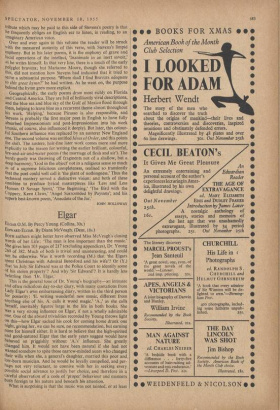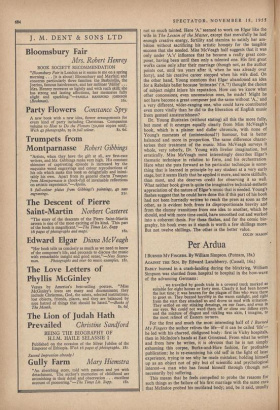Elgar
ELGAR 0.M. By Percy Young. (Collins, 30s.) EDWARD ELOAR. By Diana McVeagh. (Dent, 18s.) ROTn authors might better have observed Miss McVeagh's closing words of her Life : 'The man is less important than the music,' She gives him 103 pages of 217 (excluding appendices), Dr. Young 260 of 382. Much of both is trivial and uninteresting, and could . not be otherwise, Was it 'worth recording (M.) that 'the Elgars ent Christmas with Admiral Beresford and his wife'? Or (Y.) that 'in July Sir Edward was at the Police Court to identify some of his stolen property'? And why 'Sir Edward'? It is hardly less belittling than `Dr. Elgar.'
This is the general tone of Dr. Young's biography—an intimate and often ridiculous day-to-day diary, with many quotations from Lady Elgar's own embarrassing diary, written in the third person for posterity: 'E. writing wonderful new music, different from anything else of his. A. calls it wood magic.' A.,' as she calls herself, inevitably figures large in the life in both books. She was a very strong influence on Elgar, if not a wholly admirable one. One of the absurd trivialities recorded by Young throws light en this—how Elgar sacked his cook for coming home drunk one night, giving her, we can be sure, no recommendation, but earning none for himself either. It is hard to believe that the high-spirited and good-natured Elgar that the early years suggest would have behaved so priggishly without `A.'s' influence. She greatly changed him. It would not have been natural if she had not wanted somehow to spite those narrow-minded aunts who changed their wills when she, a general's daughter, married this poor and, low-born musician. And he would be loyally compelled, and per- haps not very reluctant, to connive with her in seeking every Possible social advance to justify her choice, and therefore in a careful observation of a code of 'proper' behaviour and manners. both foreign to his nature and beneath his attention.
What is surprising is that the music was not tainted, or at least not so much tainted. Here 'A.' seemed to work on Elgar like the wife in The Lesson of the Master, except that mercifully he had enough creative energy, fertility and stamina to satisfy her am- bition without sacrificing his artistic honesty for the tangible success that she needed. Miss McVeagh half suggests that it was only under `A.'s' influence that he became a really great com- poser, having been until then only a talented one. His first great works came only after their marriage (though not, as the author points out, until ten years after it, when he was already over forty), and his creative career stopped when his wife died. On the other hand, Young mentions that Elgar abandoned an idea for a Rabelais ballet because 'intimates' ('A.'?) thought the choice of subject might injure his reputation. How can we know what other concessions, even unconscious ones, he made? Might he not have become a great composer just the same without `A.,' and a very different, wider-ranging one, who could have contributed even more vitally than he did to the liberation of English music from genteel amateurishness?
Dr. Young illustrates (without stating) all this the more fully, but most of it emerges equally clearly from Miss McVeagh's book, which is a plainer and duller chronicle, with none of Young's moments of (unintentional?) humour, but is better balanced and more in proportion. The same difference charac- terises their treatment of the music. Miss McVeagh surveys it whole, very soberly, Dr. Young with livelier imagination, but erratically. Miss McVeagh most interestingly describes Elgar's thematic technique in relation to form, and his orchestration. Here what she puts forward as his particular technique is some- thing that is learned in principle by any student at a very early stage, but it seems likely that he applied it more, and more skilfully, than most, and she deserves credit for observing it so well. What neither book gives is quite the imaginative technical-xsthetic appreciation of the nature of Elgar's music that is needed. Young's flashes suggest that he could have done this if this part of his book had not been hurriedly written to reach the press as soon as the other, as is evident both from its disproportionate brevity and from the clumsy transitions from one idea to another, which he should, and with more time could, have smoothed out and worked into a coherent thesis. For these flashes, and for the comic bio- graphy, his book even as it stands is worth a few shillings more. But not twelve shillings. The other is the better value.
COLIN MASON'











































































 Previous page
Previous page